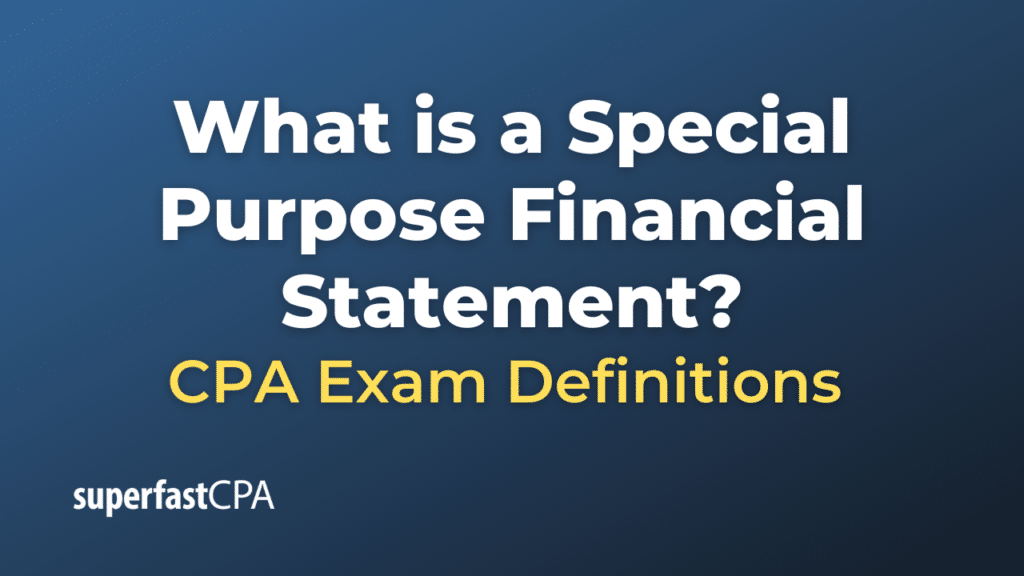Special Purpose Financial Statement
A Special Purpose Financial Statement (SPFS) is a set of financial statements prepared for a specific purpose and not intended for general-purpose use. Unlike general-purpose financial statements, which are prepared to meet the broad needs of many users, special purpose financial statements are tailored to meet specific financial information needs of certain users or to comply with specific contractual or regulatory requirements.
Here are some contexts in which SPFS might be prepared:
- Contractual Basis: If two companies enter into an agreement or contract, one of the companies might be required to provide financial information only related to the operations or assets covered by the agreement. In such cases, an SPFS can be prepared.
- Tax Reporting: In some jurisdictions, the tax authorities might require a set of financial statements that are prepared specifically based on tax rules, which might differ from general financial reporting standards.
- Regulatory Basis: Some industries or sectors might have specific regulatory bodies that require certain financial disclosures that are different from general-purpose statements. For example, a regulatory authority might require a financial statement that only reports on regulated activities.
- Trusts and Estates: Financial statements for trusts and estates might be prepared to meet specific needs or requirements of beneficiaries or to comply with trust agreements or estate laws.
- Liquidation Basis: If a company is in the process of being liquidated, the financial statements might be prepared on a liquidation basis, which reflects the estimated amounts that will be realized as the company’s assets are sold off and liabilities are settled.
- Internal Management Use: A company might prepare an SPFS for internal use by management, focusing on specific aspects of the business or using a different accounting basis than what’s used for the general-purpose statements.
When reviewing or relying on a Special Purpose Financial Statement, it’s crucial for users to understand the purpose for which it was prepared and the basis of accounting used. This ensures that the statements are interpreted correctly and that decisions are made based on accurate and relevant information.
Example of a Special Purpose Financial Statement
Let’s delve into an example involving a contractual basis, which is one of the contexts in which an SPFS might be prepared.
Scenario: Real Estate Joint Venture
- Setting the Scene:
- Company A and Company B decide to enter into a joint venture (JV) to develop a large commercial property.
- They create a new entity, PropertyJV, to manage and oversee the development.
- Both companies contribute funds and assets to PropertyJV to support the project.
- Contractual Agreement:
- As part of their JV agreement, both Company A and Company B stipulate that they want to see financial statements specifically related to the construction phase of the project.
- They’re not interested in the subsequent leasing operations or any other aspects at this time. They want to monitor the construction costs closely to ensure the project remains within budget.
- Special Purpose Financial Statement (SPFS):
- PropertyJV prepares an SPFS that exclusively focuses on the construction phase.
- The SPFS includes details about funds received from both companies, all construction-related expenses, any loans or financing specific to the construction, and the current status of construction in terms of percentage completion.
- This SPFS excludes details about leasing operations, long-term facility management, or any other activities not related to construction.
- Use of the SPFS:
- Note to the SPFS:
- It’s essential that this SPFS comes with notes or a statement indicating its specific purpose, which is to monitor and report on the construction phase. This ensures that anyone who views the statement understands its context and limitations.
In this example, the SPFS serves a precise need, allowing the JV partners to focus solely on the construction phase of their project. This specificity ensures transparency and allows the partners to make informed decisions without being distracted or confused by unrelated financial data.













